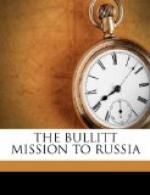it to us personally:
“There is a fight to be made against the Bolsheviks, but so long as you foreigners are making it, we Russians won’t. When you quit and leave us alone, we will take up our burden again, and we shall deal with the Bolsheviks. And we will finish them. But we will do it with our people, by political methods, in the Soviets, and not by force, not by war or by revolution, and not with any outside foreign help.”
This is the nationalistic spirit, which we call patriotism, and understand perfectly; it is much stronger in the new than it was in the old, the Tsar’s, Russia. But there is another force back of this remarkable statement of a remarkable state of mind.
All Russia has turned
to the labor of reconstruction; sees
the idea in the plans
proposed for the future; and is
interested—imaginatively.
Destruction was fun for a while and a satisfaction to a suppressed, betrayed, to an almost destroyed people. Violence was not in their character, however. The Russian people, sober, are said to be a gentle people. One of their poets speaks of them as “that gentle beast, the Russian people,” and I noticed and described in my reports of the first revolution how patient, peaceable, and “safe” the mobs of Petrograd were. The violence came later, with Bolshevism, after the many attempts at counterrevolution, and with vodka. The Bolshevik leaders regret and are ashamed of their red terror. They do not excuse it. It was others, you remember, who traced the worst of the Russian atrocities and the terror itself to the adoption by the counter-revolutionists of the method of assassination (of Lenin and others), and most of all to the discovery by the mobs of wine cellars and vodka stills. That the Russian drunk and the Russian sober are two utterly different animals, is well known to the Jews, to the Reactionaries, and to the Russians themselves. And that is why this people lately have not only obeyed; they have themselves ruthlessly enforced the revolutionary prohibition decrees in every part of Russia that we would inquire about and hear from.
The destructive spirit,
sated, exhausted, or suppressed, has
done its work.
The leaders say so—the leaders of all
parties.
There is a close relationship between the Russian people and the new Russian leaders, in power and out. New men in politics are commonly fresh, progressive, representative; it’s the later statesmen that damp the enthusiasm and sober the idealism of legislators. In Russia all legislators, all, are young or new. It is as if we should elect in the United States a brand-new set of men to all offices, from the lowest county to the highest Federal position, and as if the election should occur in a great crisis, when all men are full of hope and faith. The new leaders of the local Soviets of Russia were, and they still are, of the people, really. That




